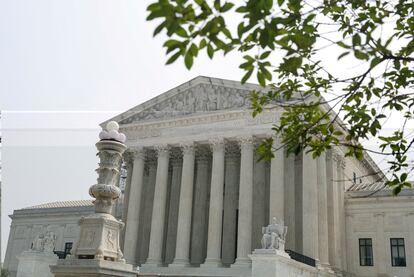Supreme Court blocks OxyContin maker’s bankruptcy deal that would shield Sackler family members
The deal would allow the company to emerge from bankruptcy as a different entity, with its profits used to fight the opioid epidemic

The Supreme Court on Thursday blocked a nationwide settlement with OxyContin maker Purdue Pharma that would shield members of the Sackler family who own the company from civil lawsuits over the toll of opioids.
The justices agreed to a request from the Biden administration to put the brakes on an agreement reached last year with state and local governments. In addition, the high court will hear arguments before the end of the year over whether the settlement can proceed.
The deal would allow the company to emerge from bankruptcy as a different entity, with its profits used to fight the opioid epidemic. Members of the Sackler family would contribute up to $6 billion.
But a key component of the agreement would shield family members, who are not seeking bankruptcy protection as individuals, from lawsuits.
The U.S. Bankruptcy Trustee, represented by the Justice Department, opposes releasing the Sackler family from legal liability.
The justices directed the parties to address whether bankruptcy law authorizes a blanket shield from lawsuits filed by all opioid victims.
The 2nd U.S. Circuit Court of Appeals had allowed the reorganization plan to proceed.
Lawyers for Purdue and other parties to the agreement had urged the justices to stay out of the case. “This is a baseless stay application that, if granted, would harm victims and needlessly delay the distribution of billions of dollars to abate the opioid crisis,” Purdue’s lawyers wrote.
Ed Neiger, a lawyer representing individual victims of the opioid crisis who would be in line for a piece of the settlement, said it was a disappointment that they would have to wait longer for any compensation but also praised the court for agreeing to hear the case so soon. “They clearly see the urgency of the matter,” he said.
Another group of mostly parents of people who died from opioid overdoses has called for the settlement not to be accepted.
Opioids have been linked to more than 70,000 fatal overdoses annually in the U.S. in recent years. Most of those are from fentanyl and other synthetic drugs. But the crisis widened in the early 2000s as OxyContin and other powerful prescription painkillers became prevalent.
Sign up for our weekly newsletter to get more English-language news coverage from EL PAÍS USA Edition
Tu suscripción se está usando en otro dispositivo
¿Quieres añadir otro usuario a tu suscripción?
Si continúas leyendo en este dispositivo, no se podrá leer en el otro.
FlechaTu suscripción se está usando en otro dispositivo y solo puedes acceder a EL PAÍS desde un dispositivo a la vez.
Si quieres compartir tu cuenta, cambia tu suscripción a la modalidad Premium, así podrás añadir otro usuario. Cada uno accederá con su propia cuenta de email, lo que os permitirá personalizar vuestra experiencia en EL PAÍS.
¿Tienes una suscripción de empresa? Accede aquí para contratar más cuentas.
En el caso de no saber quién está usando tu cuenta, te recomendamos cambiar tu contraseña aquí.
Si decides continuar compartiendo tu cuenta, este mensaje se mostrará en tu dispositivo y en el de la otra persona que está usando tu cuenta de forma indefinida, afectando a tu experiencia de lectura. Puedes consultar aquí los términos y condiciones de la suscripción digital.








































